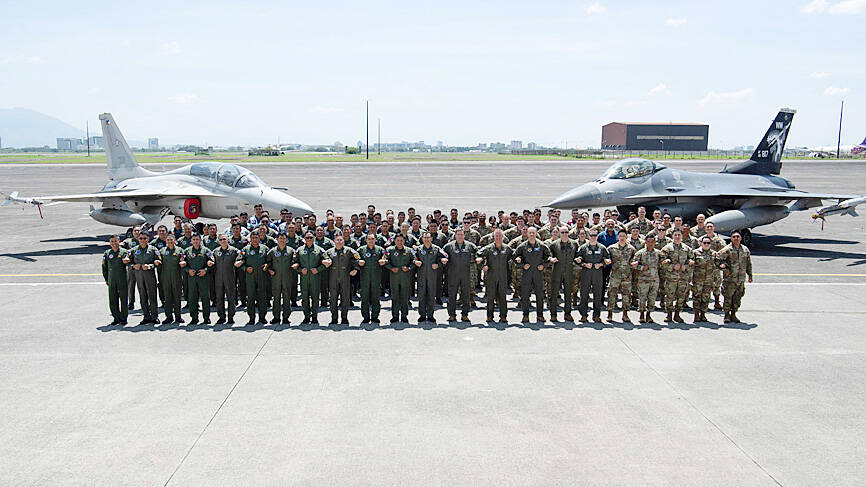The Philippine and US air forces yesterday commenced joint exercises aimed at boosting operational coordination and enhancing “strategic deterrence,” the Philippine military said.
The drills follow months of confrontations between Beijing and Manila over disputed areas of the South China Sea, with significantly larger US-Philippine air, land and sea exercises set for later this month.
“Enhancing combat readiness and elevating joint mission effectiveness” would be central to the Cope Thunder exercise, Philippine Air Force Commander Arthur Cordura said at a ceremony to launch the drills.

Photo: AFP
Military ties between Manila and Washington have deepened since the 2022 election of Philippine President Ferdinand Marcos Jr, with Manila pushing back on sweeping Chinese claims in the South China Sea that an international tribunal has ruled are without merit.
The US Department of State last week approved a long-mooted sale of F-16 jets to the Philippines, although Manila said the deal was “still in the negotiation phase.”
Speaking at yesterday’s ceremony, US Major General Christopher Sheppard said that “the pace of our alliance is accelerating.”
Cope Thunder, which is to continue through Friday next week, aims to enhance “asymmetric warfare capabilities,” operational coordination and strategic deterrence, the Philippine Air Force said.
“Further down the road, we look forward to the seamless transition to exercise Balikatan, which will continue to push the boundaries of our interoperability,” Cordura said.
Like the majority of Balikatan’s planned activities, Cope Thunder is to be conducted on northern Luzon island, the area of the Philippines closest to Taiwan.
As China encircled Taiwan with planes and ships in a simulated blockade last week, Armed Forces of the Philippines Chief of Staff General Romeo Brawner Jr warned troops that their nation would “inevitably” be involved should Taiwan be invaded.
Manila later said that Brawner’s comments were primarily referencing efforts to retrieve Filipino workers from Taiwan.

DAREDEVIL: Honnold said it had always been a dream of his to climb Taipei 101, while a Netflix producer said the skyscraper was ‘a real icon of this country’ US climber Alex Honnold yesterday took on Taiwan’s tallest building, becoming the first person to scale Taipei 101 without a rope, harness or safety net. Hundreds of spectators gathered at the base of the 101-story skyscraper to watch Honnold, 40, embark on his daredevil feat, which was also broadcast live on Netflix. Dressed in a red T-shirt and yellow custom-made climbing shoes, Honnold swiftly moved up the southeast face of the glass and steel building. At one point, he stepped onto a platform midway up to wave down at fans and onlookers who were taking photos. People watching from inside

A Vietnamese migrant worker yesterday won NT$12 million (US$379,627) on a Lunar New Year scratch card in Kaohsiung as part of Taiwan Lottery Co’s (台灣彩券) “NT$12 Million Grand Fortune” (1200萬大吉利) game. The man was the first top-prize winner of the new game launched on Jan. 6 to mark the Lunar New Year. Three Vietnamese migrant workers visited a Taiwan Lottery shop on Xinyue Street in Kaohsiung’s Gangshan District (崗山), a store representative said. The player bought multiple tickets and, after winning nothing, held the final lottery ticket in one hand and rubbed the store’s statue of the Maitreya Buddha’s belly with the other,

‘NATO-PLUS’: ‘Our strategic partners in the Indo-Pacific are facing increasing aggression by the Chinese Communist Party,’ US Representative Rob Wittman said The US House of Representatives on Monday released its version of the Consolidated Appropriations Act, which includes US$1.15 billion to support security cooperation with Taiwan. The omnibus act, covering US$1.2 trillion of spending, allocates US$1 billion for the Taiwan Security Cooperation Initiative, as well as US$150 million for the replacement of defense articles and reimbursement of defense services provided to Taiwan. The fund allocations were based on the US National Defense Authorization Act for fiscal 2026 that was passed by the US Congress last month and authorized up to US$1 billion to the US Defense Security Cooperation Agency in support of the

HIGH-TECH DEAL: Chipmakers that expand in the US would be able to import up to 2.5 times their new capacity with no extra tariffs during an approved construction period Taiwan aims to build a “democratic” high-tech supply chain with the US and form a strategic artificial intelligence (AI) partnership under the new tariffs deal it sealed with Washington last week, Taipei’s top negotiator in the talks said yesterday. US President Donald Trump has pushed Taiwan, a major producer of semiconductors which runs a large trade surplus with the US, to invest more in the US, specifically in chips that power AI. Under the terms of the long-negotiated deal, chipmakers such as Taiwan Semiconductor Manufacturing Co (TSMC, 台積電) that expand US production would incur a lower tariff on semiconductors or related manufacturing